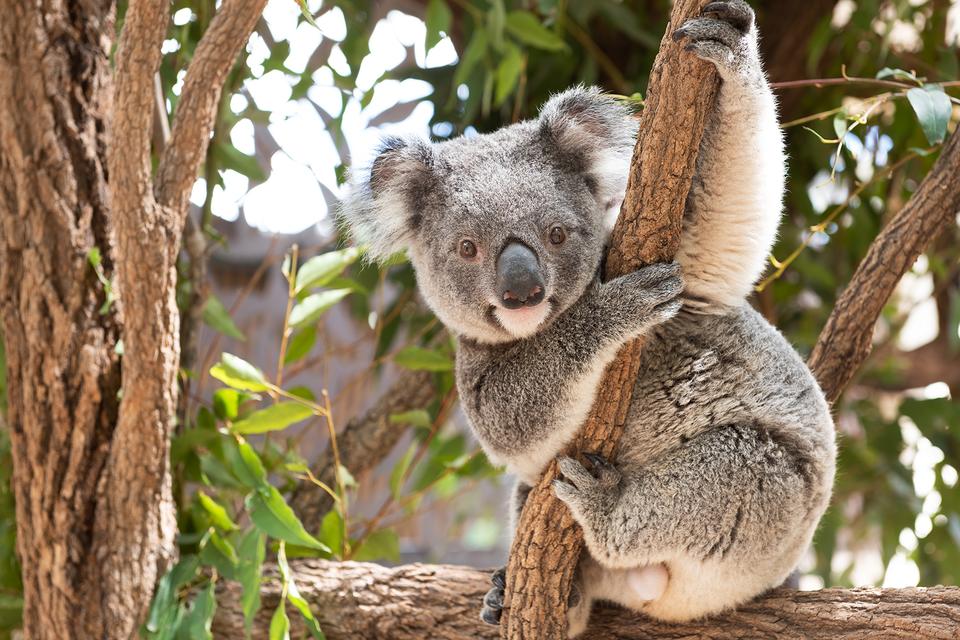Averting the Threat to a Native Icon

Description
Koala Research-CQ, (Central Queensland, Australia), is a community funded research program designed to support research on koala biology, habitat, and the effect on koala populations by development in Central Queensland.
Partners
Queensland Parks and Wildlife Service, Department of Transport and Main Roads, Earthwatch (Australia and International), various intra/inter-state and international universities, natural resource management groups and citizen scientists/community volunteers.
Impact
This project has resulted in the provision of expert advice to the National Koala Conservation Strategy with the listing of the koala as endangered; and the development of the first set of Commonwealth Environment Protection and Biodiversity Conservation Act regulatory referral guidelines. It has also improved local on-ground management through the Queensland Parks and Wildlife Service, and the Department of Transport and Main Roads, as well as revised strategic planning, regulation, monitoring and management through state departments.
Researcher
Dr Flavia Santamaria and Dr Rolf Schlagloth
Adverse health conditions and declining populations have been threatening the survival of koalas in certain regions around the country, but concerted efforts from a dedicated research team in Central Queensland are proving to reverse this trend in efforts to see koala populations thriving once more.
Led by CQUniversity researchers Dr Flavia Santamaria and Dr Rolf Schlagloth, the Rockhampton-based team are leading the charge in identifying and mitigating the cause of the decline in the native animals’ health and their distribution specifically in Central Queensland, Australia, where little has been known about their habitation numbers.
While the native animal is known to be one of Australia’s favourite icons, there are several threats facing them today including climate change, habitat loss due to natural disasters and urbanisation, disease and motor vehicle strikes, all resulting in declining populations and inducing chronic health conditions caused by stress.
Through Koala Research-CQ (KR-CQ), a community-funded research program hosted by the University, Dr Santamaria and Dr Schlagloth have supported research on koala biology, habitat, and the effects of rural, urban and industrial development on koala populations in Central Queensland.
“We believe that the koala is a flagship for conservation, education and community engagement and therefore KR-CQ investigates all aspects of the koala,” Dr Schlagloth says.
The insights of the research project have led to improved conservation management, strategic planning and policymaking in relation to the native animal, as well as challenging public and corporate perceptions around perceived barriers to conservation of the species. This has now led to implemented changes in the conservation listing at state, national and international levels.
The team have been working in partnership and collaboration with key federal, state and local government departments and agencies to improve and implement policy revisions regarding regulatory oversight of koala-related developments, new state-based strategic planning, and revision of local habitat management practices.
One of the projects has seen the implementation of surveillance strategies with the Department of Transport and Main Roads in efforts to decrease the amount of vehicle collisions along major highways. The team is also involved in the Government’s consultation process to address the threat of chlamydial disease to koala populations in Queensland, Australia, and is supporting this with applied research.
Expert advice from the group has informed the National Koala Conservation Strategy, listing of the koala as endangered, and the development of the first set of Commonwealth Environment Protection and Biodiversity Conservation Act regulatory referral guidelines. These rich partnerships with state, federal and private organisations have proved to enable the translation of research findings into results with valuable, lasting impacts.
Furthering their work, the research team collaborate with international and national researchers, and they gather local knowledge through citizen scientists and community volunteers to not only aid their efforts but increase awareness. Having deployed a media engagement strategy and community survey, they are obtaining further knowledge to inform their future research and identify areas of much-needed restoration. From the outset, this important koala research has been driven by community partnership and engagement, which has resulted in a ripple effect of widespread awareness and action.
The combination of valuable insight and on-ground assistance from community volunteers and landholders has contributed to invaluable data collection and analysis of the resourcing required for rehabilitation of sick or injured koalas. Detailed photographs of koalas identified in the wild has also assisted in identifying physical signs of clinical stress-induced disease, while faecal collection has allowed for non-invasive analysis of the animals’ health through gut microbiome, in-depth analysis of stress levels and disease, further informing conservation strategies.
With the vast community awareness and media endorsement through local ABC (Australian Broadcasting Corporation) outlets and commercial media, deep and meaningful impact has resulted, in particular, from partnerships with Earthwatch Australia/International and the Fitzroy Basin Association, who engage with community members and corporate volunteer teams.
Beyond this, the important resonance of conservation of this species runs deeper, embedded into the historical relationship that exists between First Nations Australians and the koala, with research publications exploring this and identifying the koala’s function as a flagship for conservation and community education.
According to Justin Foster, Director of Research Programs for Earthwatch Australia, “a broad spread of awareness in the source community resulted from KR-CQ projects”.
This increased knowledge of issues around koala ecology and conservation is an important contribution to environmental awareness at a local, national, and international level. While greater awareness has been achieved with new policy development, the research team are still underway with their research efforts to ensure the longevity of koalas in Central Queensland for generations to come.
CQU research efforts hope to ensure the longevity of koalas for generations to come. Community-driven efforts inform policy, conservation, and habitat management for thriving populations."
Connect with CQUniversity
At CQUniversity we know the value of our connections locally and around the world. Our partnerships help us create opportunities, deliver solutions and change lives. From time to time, we share our Connections Count update where we share our highlights, including research impact stories like the ones above. Sign up to become one of our valued connections.
